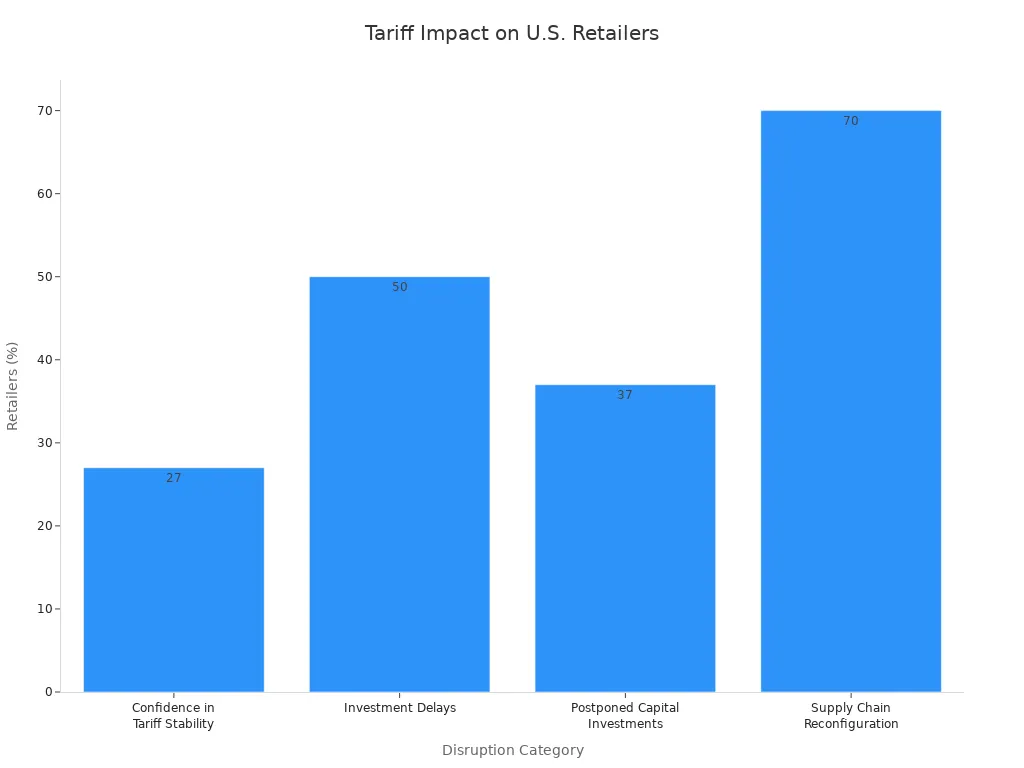In 2025, tariffs add risk and WOTC delivers workforce stability

Tariffs create uncertainty for stores and workers in the U.S. The retail sector provides jobs to about 13.7 million people, making it very important for the economy. Many businesses face challenges when tariffs create uncertainty, disrupt supply chains, and raise costs.
Impact Area | Description |
|---|---|
Supply Chain Adjustments | Retailers change how they source products and manage inventory to deal with tariffs creating uncertainty. |
Price Increases | Higher costs due to tariffs create uncertainty, leading stores to raise prices, which alters consumer shopping behavior. |
Job Stability | Careful shoppers, influenced by the uncertainty created by tariffs, can make jobs in retail less stable. |
The National Retail Federation (NRF) is committed to ensuring workers have stable jobs. NRF advocates for the continuation of the Work Opportunity Tax Credit, which helps stores build stronger teams and enables workers to thrive.
Key Takeaways
Tariffs make things less certain for stores. This can cause prices to go up. It can also mess up how stores get their products.
The Work Opportunity Tax Credit (WOTC) helps stores hire people who have trouble finding jobs. This helps keep workers steady in stores.
WOTC gives stores money rewards. This makes it easier to train and hire new workers.
Having different kinds of people in stores helps solve problems better. It also makes communities stronger.
Supporting WOTC can help keep jobs safe when the economy is not steady.
Tariffs Create Uncertainty for Retailers

Disrupted Supply Chains and Costs
Tariffs make things less certain for stores in the U.S. Many stores need steady trade to keep shelves full and prices fair. When tariffs change, stores must act fast to fix their supply chains. They might look for new suppliers, change how they ship goods, or even make new products. These changes cost time and money.
Evidence Type | Statistic | Description |
|---|---|---|
Confidence in Tariff Stability | Retailers are unsure if tariffs will stay the same. | |
Investment Delays | 50% | Half of retailers wait or spend less because of tariffs. |
Postponed Capital Investments | 37% | Many stores wait 7 to 12 months to spend on big projects. |
Supply Chain Reconfiguration | 70% | Most stores change their supply chains because of tariffs. |

Studies show tariffs make prices go up in stores. On average, prices are about 4.9% higher. Imported goods cost about 6% more. Domestic goods cost about 4.3% more. These numbers show tariffs make things less certain for stores and shoppers. Higher prices can change how families shop and what they buy.
Impact on Hiring and Investment
Tariffs cause problems that go beyond supply chains. Many stores must think again about hiring and spending money. Some stores wait to hire new workers or open new locations. Others stop big projects or spend less on training. These choices affect workers, families, and whole towns.
Stores change how they get products and manage supply chains because tariffs are unpredictable.
Small stores have a hard time with tariff changes, which makes it tough to compete.
Companies make supply chains more flexible, which changes how they hire and invest in shipping.
Almost all import companies in the U.S. are small businesses. Over half of small business owners say tariffs are a big problem, right after inflation. When tariffs make things less certain, small businesses feel it first. They may have trouble keeping workers or buying new technology.
The National Retail Federation (NRF) supports stores and workers. NRF knows retail helps 55 million people have jobs. When tariffs make things less certain, every store and job is affected. NRF keeps working for rules that help stores and workers stay strong.
WOTC Supports Workforce Stability

What Is the Work Opportunity Tax Credit?
The Work Opportunity Tax Credit (WOTC) is a helpful program for stores. It is a federal tax credit. Stores get rewarded when they hire people who have trouble finding jobs. WOTC helps stores build better teams. It gives hope to people who want a new start.
Stores use WOTC to hire workers from many backgrounds. The program helps groups who often have a hard time getting jobs. These groups include:
Temporary Assistance for Needy Families (TANF) recipients
Supplemental Nutrition Assistance Program (SNAP) recipients
Empowerment Zone residents
Vocational Rehabilitation or Ticket-to-Work participants
Recently released ex-felons
Supplemental Security Income (SSI) recipients
Disabled veterans who were discharged or unemployed for more than six months
Unemployed veterans
Veterans receiving SNAP
Long-term unemployment recipients
WOTC also helps:
Qualified veterans
Qualified IV-A recipients
Qualified ex-felons
Designated community residents
Vocational rehabilitation referrals
Summer youth employees
Qualified SNAP recipients
SSI recipients
Long-term family assistance recipients
Qualified long-term unemployment recipients
Stores see WOTC as a way to help people who want to work. The program brings new energy to stores. It helps communities become stronger.
Benefits for Retailers and Workers
WOTC gives real benefits to stores and workers. Stores save money when they hire with WOTC. The tax credit helps pay for training and hiring new workers. This makes it easier for stores to add new team members.
WOTC helps stores hire many kinds of people. Employers look past resumes and give chances to people who might not get noticed. This means more jobs for people who have trouble finding work.
Workers get more than just money. They learn new skills and get experience. Many start with basic jobs and move up to better positions. Steady jobs help people earn money and take care of their families.
Stores see their teams become stronger and more mixed. Stores become places where everyone feels welcome. Communities get better when more people find steady jobs and break out of poverty.
WOTC is very helpful when times are tough. When tariffs and world problems make business hard, WOTC helps keep things steady. Stores use this program to fill important jobs and stay open. Workers find hope and a way to succeed.
WOTC is a bright spot for stores. It helps people, makes businesses stronger, and builds tough communities. Stores and workers move forward together, ready for the future.
Comparing Risk and Stability
Economic Impact on Retailers
Retailers have hard choices when things change. Tariffs make things uncertain for stores. This makes it tough to plan ahead. Many stores wait to spend money or hire new people. Some stores stop training workers. These choices slow down growth. They also limit new chances for workers.
The numbers show what is happening:
Study | Findings |
|---|---|
Autor et al. (2024) | US import tariffs do not help jobs; foreign tariffs hurt jobs. |
Javorcik et al. (2022) | Tariffs do not make stores hire more; higher costs mean fewer jobs. |
Stores do better when they can plan and invest. WOTC helps stores do this. The program gives rewards for hiring people who need a new start. It helps stores build strong teams. It also helps stores stay open when things change.
Effects on Workers and Communities
Tariffs make things uncertain for workers and families. When stores have problems, jobs are not as safe. Wages may not go up much. Some workers worry about losing hours or jobs. This stress can spread through whole towns.
WOTC brings hope and helps people feel safe. The program helps people find steady jobs and learn new skills. It also helps towns by giving more people a chance to do well.
WOTC gives money to stores for hiring people who need help. This lowers unemployment and helps families take care of themselves.
The program helps veterans and ex-felons get full-time jobs. This lowers the chance they go back to old habits.
Stores can get up to $9,600 for hiring veterans. This helps keep veterans working.
For every $1.00 in credits, the government saves about $11.36. This means less need for help from the government.
When new workers earn money, they spend it nearby. This helps local stores grow.
WOTC also helps stores have different kinds of workers. Teams with many kinds of people find new ways to solve problems. Towns get stronger when everyone can work and do well.
The Case for Extending WOTC
Countering Tariff Uncertainty
Tariffs make things unsure for stores and workers everywhere. Many stores do not know what will happen next. They want to hire and train new people, but changing prices make it hard to plan. WOTC is a steady help during these times. The program gives stores a reason to keep hiring, even when things feel risky.
WOTC helps stores make strong teams. It gives hope to people who want a new start. When stores use WOTC, they can focus on growing. Workers feel safer in their jobs. Families can count on regular pay. Communities get stronger when more people have jobs.
WOTC helps when other things are not steady. It lets stores and workers move forward together.
Policy Recommendations
The National Retail Federation wants a strong and steady workforce. NRF asks Congress to keep WOTC or make it last forever. This will help stores keep hiring and training, even when tariffs make things unsure. NRF also supports other ideas to help stores and workers:
Make visa programs for workers bigger and better.
Make it easier to hire new workers.
Make sure all workers get fair and fast processing.
Give steady jobs to workers who have served a long time.
These ideas will help stores find the workers they need. Workers will have more chances to grow their careers. NRF stands with stores and workers and asks for help now. Congress can help by making WOTC a lasting part of the tax code. Together, everyone can make a better future for retail.
Tariffs make things less certain for stores. There are fewer jobs for workers. WOTC gives hope and helps keep jobs steady. The table shows how tariffs hurt workers in stores:
Impact of Tariffs on Retail Workforce | Details |
|---|---|
Job Openings Drop | |
Timeframe | First Quarter |
Implications | Stores rethink hiring plans |
WOTC helps stores and workers do better. Stores can help WOTC by:
Using tax breaks to hire from special groups
Thinking about WOTC when hiring new people
Working with experts to follow the rules
Using new tools to get more people involved
NRF asks leaders to keep WOTC forever. If everyone works together, stores can have more jobs for all kinds of people.
FAQ
What is the Work Opportunity Tax Credit (WOTC)?
WOTC rewards stores for hiring people who face challenges finding jobs. This program helps build strong teams and gives hope to workers who want a fresh start.
How does WOTC help communities?
WOTC brings new energy to stores and helps people move from temporary jobs to lasting careers. Communities grow stronger when more people find steady work and support their families.
Why do retailers support WOTC?
Retailers see WOTC as a way to create stable jobs. The program helps stores save money on training and encourages hiring from many backgrounds. Stores become places where everyone feels welcome.
How do tariffs affect retail jobs?
Tariffs create uncertainty for stores and workers. Many retailers must change how they hire and invest. This makes it harder for families to count on steady jobs.
Can WOTC help during tough economic times?
WOTC gives stores a reason to keep hiring, even when business feels risky. The program helps workers find hope and supports stores as they face new challenges.
See Also
Upcoming Changes to Walmart's Self-Checkout Experience in 2025
The PARC at Tysons: Evolving From Retail Space to Community Center
The Future of Retail: Embracing AI-Driven Store Innovations
Enhancing Office Efficiency Through Intelligent Vending Machines
